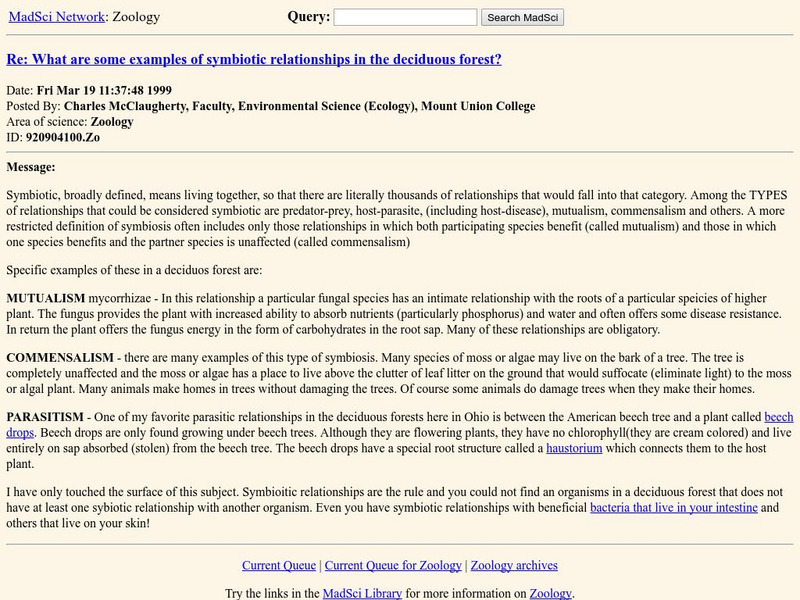Curated OER
Tortoise Tales
Students read journal entry from a Gal??pagos field researcher, find examples of five ecological relationships (competition, predation, parasitism, mutualism, and commensalism) and take notes on the details they find in the entry using a...
Curated OER
Worm Interviews
Students identify types of worms. In this organisms lesson plan, students are shown slides of the different types of worms and take notes on each worm. Students answer questions about each worm.
Curated OER
The Three Worm Phyla
Ninth graders examine the three worm phyla. In this classification instructional activity, 9th graders observe, compare and contrast the planarian, tapeworm, and fluke.
Curated OER
Malaria
For this malaria worksheet, students answer 8 short answer questions regarding the disease malaria, what causes it and how it can be controlled.
Curated OER
Wetlands - Food Web Relationships
In this food web relationships worksheet, students click on the links to learn about the food web relationships in the wetlands and answer short answer questions about it. Students complete 8 questions total.
Curated OER
Prey or Pray? Could YOU Escape a Cheetah?
Tenth graders estimate the size of an adult cheetah by research and measurement of a picture. They determine the approximate distance and speed of the cheetah from a filmed chase and compare that to their own running speed.
Curated OER
Critter Encounter Chart
Students record data found at an assigned web site. In this data collection lesson plan, students access an assigned web site in order to complete a data chart about animals they see. They travel to different sections of the web site to...
Curated OER
Household Pests
Sixth graders discover the various habitat requirements for assorted household pests from ants to wasps. They conduct various activities including researching the life cycles moths, cockroaches, and mosquitoes
Curated OER
Communicable Diseases Word Puzzle
In this word puzzle, learners identify twenty one words related to communicable diseases in a word puzzle. Examples include parasite, host, lymphocytes, and vaccines.
Curated OER
English Vocabulary Skills: AWL Sublist 9 - Exercise 5c
In this online interactive English vocabulary skills instructional activity, students answer 10 matching questions which require them to fill in the blanks in 10 sentences. Students may submit their answers to be...
Curated OER
Mixed Prepositions 20
In this online interactive English vocabulary skills worksheet, students respond to 13 multiple choice questions that require them to fill in the blanks in sentences with the appropriate prepositions.
Curated OER
How Do You Do?
Seventh graders research organisms in the Merritt Island National Wildlife Refuge. They create a picture book demonstrating their understanding of relationships.
Climate Literacy
Clean: Climate Change and Disease
Students research the relationship between hosts, parasites, and vectors for common vector-borne diseases and evaluate how climate change could affect the spread of disease.
Science Education Resource Center at Carleton College
Serc: Mn Step: The Flow of Energy: Balancing Ecosystems
A lesson outlining activities for a science unit where students can learn about the relationships and the flow of energy within an ecosystem. These include predator and prey, hosts and parasites, and consumers, producers, and decomposers.
BiologyWise
Biology Wise: Parasitic Flatworms
Describes types of flatworms that are parasitic to humans and animals and what their life cycle looks like. Two or more hosts are needed for them to complete their life cycle.
Biology 4 kids
Biology4 Kids: And Still More Protozoa
An overview of the structure of protozoa. Identify those protists with hair or tails as well as those which cannot live on their own and require a host.
MadSci Network
Symbiotic Relationships in the Deciduous Forest
A brief definition of symbiotic, followed by explanations of mutualism, commensalism, and parasitism.
BiologyWise
Biology Wise: Roundworm Characteristics
Describes roundworm characteristics, including their classification, habitat, reproduction, infection of humans and pets, and how they are transmitted to other hosts. Includes some examples and the diseases they cause.
CK-12 Foundation
Ck 12: Biology: Symbiosis
[Free Registration/Login may be required to access all resource tools.] Overview of symbiotic relationships.
TED Talks
Ted: Ted Ed: Is There a Disease That Makes Us Love Cats?
Today, about a third of the world's population is infected with a strange disease called toxoplasmosis-and most of them never even know it. And while the parasite can multiply in practically any host, it can only reproduce sexually in...


















